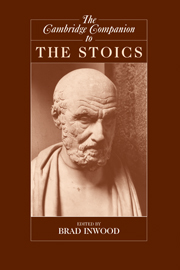Book contents
- Frontmatter
- Introduction
- 1 The School, from Zeno to Arius Didymus
- 2 The School in the Roman Imperial Period
- 3 Stoic Epistemology
- 4 Logic
- 5 Stoic Natural Philosophy (Physics and Cosmology)
- 6 Stoic Theology
- 7 Stoic Determinism
- 8 Stoic Metaphysics
- 9 Stoic Ethics
- 10 Stoic Moral Psychology
- 11 Stoicism and Medicine
- 12 The Stoic Contribution to Traditional Grammar
- 13 The Stoics and the Astronomical Sciences
- 14 Stoic Naturalism and Its Critics
- 15 Stoicism in the Philosophical Tradition
- Bibliography
- List of Primary Works
- Index
6 - Stoic Theology
Published online by Cambridge University Press: 28 May 2006
- Frontmatter
- Introduction
- 1 The School, from Zeno to Arius Didymus
- 2 The School in the Roman Imperial Period
- 3 Stoic Epistemology
- 4 Logic
- 5 Stoic Natural Philosophy (Physics and Cosmology)
- 6 Stoic Theology
- 7 Stoic Determinism
- 8 Stoic Metaphysics
- 9 Stoic Ethics
- 10 Stoic Moral Psychology
- 11 Stoicism and Medicine
- 12 The Stoic Contribution to Traditional Grammar
- 13 The Stoics and the Astronomical Sciences
- 14 Stoic Naturalism and Its Critics
- 15 Stoicism in the Philosophical Tradition
- Bibliography
- List of Primary Works
- Index
Summary
The object of Stoic theology was the governing principle of the cosmos, insofar as this could also be labeled 'god'. The Stoics accordingly regarded theology as part of physics, more specifically as that part which does not focus on the details and the purely physical aspects of cosmic processes, but rather on their overall coherence, teleology, and providential design, as well as on the question of how this cosmic theology relates to popular forms of belief and worship. Issues covered by Stoic theology include the nature of the divine principle of the cosmos, the existence and nature of the other gods, our proper attitude toward the gods - that is, the virtue of piety (eusebeia) and the opposite vice of impiety (asebeia), including our attitude toward traditional myth and ritual - and issues relating to fate and providence, including the way the providential ordering of the cosmos can be known by mankind by means of oracles and divination.
Whereas the founding father of the school, Zeno of Citium, still appears to have published his theological views in the context of his main cosmological work On the whole, his successors accorded a more prominent position to theology as a subject in its own right. Cleanthes explicitly set off theology from the rest of physics, or from physics in the narrow sense (DL VII 41), and wrote a separate work On the gods. Persaeus wrote a work On impiety. Sphaerus appears to have been the first Stoic to have written a separate work On divination. Chrysippus published not only an On the gods and an On Zeus, but also works specifically devoted to fate, providence, divination, and oracles. He appears to have followed in Cleanthes’ footsteps in treating theology as a separate subdiscipline. At any rate he claimed that it was the part of physics that was to be treated last, thus putting it at the final stage of the curriculum (the study of physics as a whole coming after logic and ethics).
- Type
- Chapter
- Information
- The Cambridge Companion to the Stoics , pp. 153 - 178Publisher: Cambridge University PressPrint publication year: 2003
- 57
- Cited by

